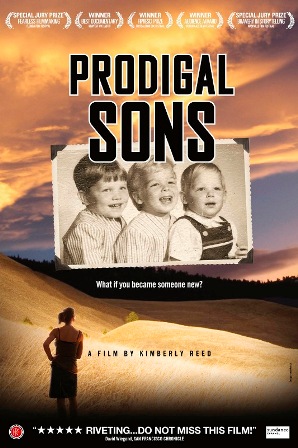Maven's Nest
Reel Life: Flick Pix

Am I my brother's keeper when he's now my sister?
By Nora Lee Mandel
PRODIGAL SONS
Written and Directed by Kimberly Reed
Produced by John Keitel and Reed
Released by First Run Features
USA. 86 min. Not Rated
Every time filmmakers turn their cameras on their own dysfunctional families there is some potential for exploitation. In Prodigal Sons director Kimberly Reed makes mea culpa a major theme, pleading that admitting her own selfish priorities as a rationalization, but it is insufficient to counter the intrusive images of her older brother.
Director Kimberly Reed's life is full enough of irony without banging the point home on her older brother who is suffering from debilitating brain damage. The opening home movies show an All-American family of three active brothers running around "a fairy tale childhood" in 1970's Big Sky Country in Montana, on a farm settled by their grandfather. But Reed ominously narrates that the oldest brother Marc McKerrow was adopted, held back in pre-school to always lag behind in the same class as his Most Likely To Succeed younger brother Paul, and at age 21 was in a horrific car accident that left him with physical and mental scars from many surgeries.
After a decade of estrangement, the competitive sibling is coming back home for their 20th Helena High School reunion, and cuts Marc little slack to deal with the recent revelation that Paul is now Kimberly and has a girlfriend. (Their mother had known about the transition far longer.) Kimberly is more patient at the reunion parties, where there are memories of winning days as the quarterback to recreate camaraderie with the football team, and, once they've had a few drinks to work up their nerve to ask, to explain to the curious women who had a crush on Paul what being a transgender lesbian feels like. When Oprah spent a full show on this documentary, these were the evolving relationships she zeroed in on as the most interesting. Quite a ways into the film, Kimberly pays nostalgic visits to the places in San Francisco where she first came out as a woman, but to Oprah she was much more open with her feelings about her drive to transition.
The support of her loyal mother, gay younger brother back in California, and old friends is not enough for Kimberly. Her heavily medicated brother suffers from personality and memory disorders that many medications can only sometimes control to keep him calm and in the present, but she still seems to want to settle some score. She helps him research his birth mother and as a filmmaker is thrilled to learn he is the grandchild of Orson Welles and Rita Haworth, allowing for many clips of them to be inserted. But the news came just before his biological mother died in 2004, so the first time he sees her is in her coffin in Tacoma, Washington. While Kimberly is busy avoiding her past with Marc and excoriating him for looking at photos of their shared male years, she drags him and his family to Croatia to meet with Welles' last paramour, Oja Kodar, who is eager to perpetuate any link to Welles. Marc can barely take in this new family's photographs and possible commonalties.
Reed's ruefulness that "We were both haunted by the same ghost"-- the repeated clips of Paul the football captain, the handsome, graceful athlete seen again and again scoring touchdowns -- registers more as a painful accusation against her less popular and accomplished brother, aggravated by excruciatingly invasive scenes of Marc's hapless struggle with his emotional control, especially when he flames into violence against family members and endures intermittent institutionalization. Even as Marc has to repeatedly apologize for his problems, Kimberly finally does seem to start to recognize that reconciliation means taking on some family responsibility before returning home to her life as an editor in New York City. But it is no wonder that her two siblings sensibly avoided exposing their angst to Oprah.
March 4, 2010
Nora Lee Mandel is a member of New York Film Critics Online and the Alliance of Women Film Journalists. Her reviews are counted in the Rotten Tomatoes TomatoMeter:
 Complete Index to Nora Lee Mandel's Movie Reviews
Complete Index to Nora Lee Mandel's Movie Reviews
Since August 2006, edited versions of many of my reviews of documentaries/indie/foreign films are at Film-Forward; since 2012, festival overviews at FilmFestivalTraveler; and, since 2016, coverage of women-made films at FF2 Media. Shorter versions of my older reviews are at IMDb's comments, where non-English-language films are listed by their native titles.
To the Mandel Maven's Nest Reel Life: Flick Pix
Copyright © 2018


